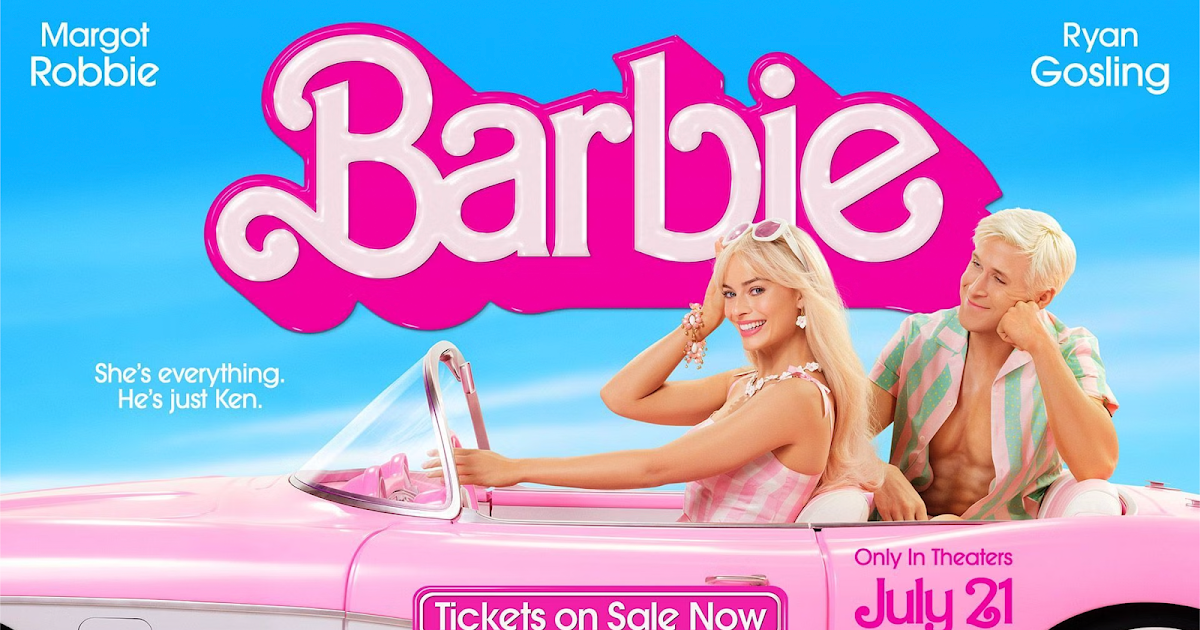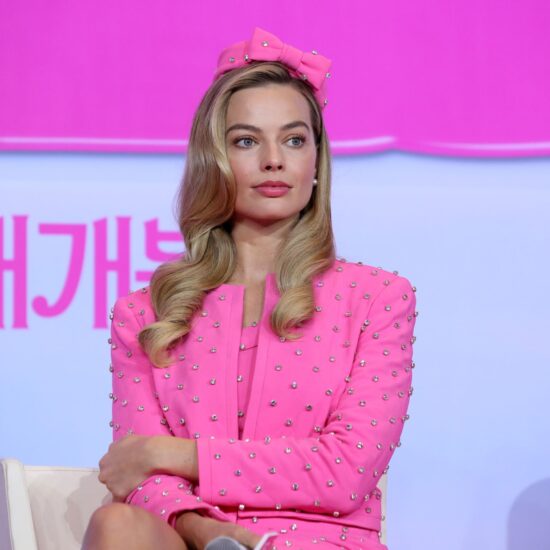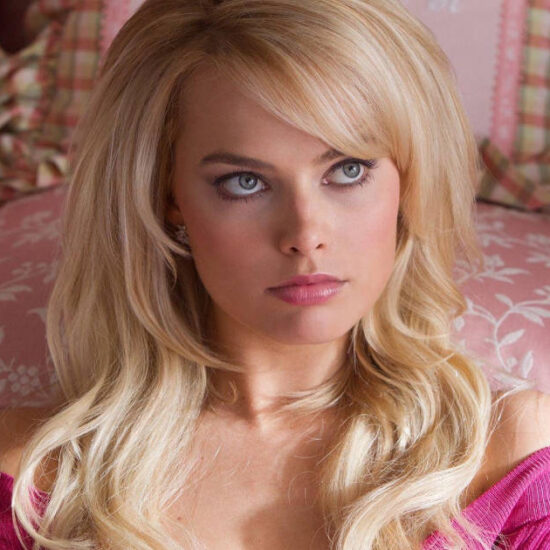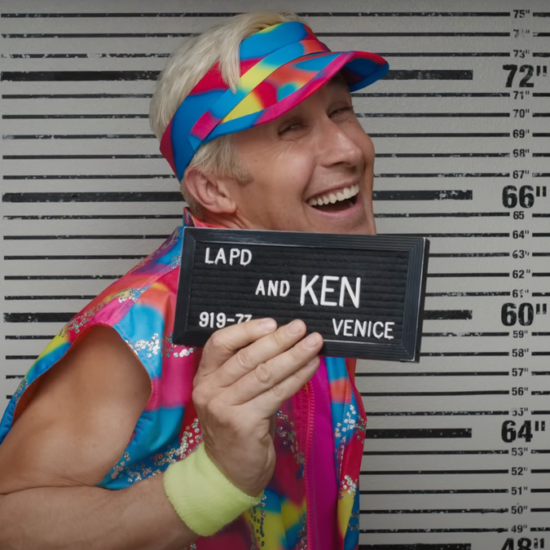
| Images courtesy of Warner/Mattel |
Leaving the press screening of Barbie, my mind was mainly occupied by two thoughts: that Greta Gerwig is an absolutely brilliant, visionary filmmaker (which we already knew of course, but it is even more clear when we see how she uses a massive studio budget), and that I am absolutely stunned that Warner and Mattel actually let her make this film. In an era of formulaic and risk-averse studio franchise movies which feel focus-grouped to death and which are primarily interested in using beloved IPs in the safest way possible to make the most money, Barbie is the exact opposite, in the most refreshing way. It is indeed a very expensive studio blockbuster film based on a beloved IP, but rather than going the safe, traditional route that Mattel board members likely would have been more comfortable with, Gerwig’s film subverts expectations again and again, takes genuine risks, and goes to fascinating, unexpected, sometimes very serious thematic places. This is absolutely the work of an indie auteur being given the keys to the summer-blockbuster kingdom with near total carte blanche, to a degree that we rarely ever see. This is not Mattel’s Barbie; this is Barbie the postmodern feminist deconstruction, driven equally by nostalgia-fueled camp silliness and unexpectedly heavy anxiety, depression, and ennui. With all the hype surrounding the film – actors calling it the best script they had ever read, and all that – I expected it to be very good, but I did not expect it to be THIS great. Barbie is an astonishing film, and I genuinely cannot believe that it actually exists, and didn’t get gutted somewhere along the way by corporate interference.
In brightly-colored Barbieland – a stunningly realized studio-created artificial universe – the Barbies and Kens (plus this dude Alan, whatever his deal is) live out their endlessly perfect, endlessly the same, totally formulaic existence, which is blissfully happy but ultimately banal, like the Talking Heads’ idea of heaven. But then Barbie has an existential crisis, suddenly struck with thoughts of death, creeping dread and anxiety, and other such totally unfamiliar human emotions. Accompanied by Ken, also full of ennui and uncertainty in his own himbo way, Barbie sets out to discover why she is being plagued by such difficult emotions – and the existential journey shakes up the safe, make-believe world of Barbieland in unexpected ways. Right from the start, with its winkingly artificial camp fantasy suddenly interrupted by Barbie casually asking, “so do you ever think about death?,” it is clear that Gerwig has made a very unusual film with a delightfully strange and off-center premise. While it is certainly a postmodern deconstruction, it isn’t entirely ironic, and while it deals in some heavier themes it certainly isn’t cynical: it walks an odd tonal tightrope, and it does it very well. It is very campy while also being sincere and genuine; it tackles some heavy themes while consistently being extremely funny. It is maximalist but also introspective and thoughtful. The script is just as great as the early buzz suggested, and Gerwig directs it with a sure hand that makes the odd mix of tones work perfectly. It would have been so easy for this wild blend of ideas to fly off the rails in the hands of a lesser director, but Gerwig nails it.
The stylized artificiality of the film is a sight to behold. Gerwig has built a truly stunning world with Barbieland, where every prop is the life-size version of a toy, and the whole thing exists on a soundstage with a sense of heightened unreality that we haven’t seen executed this well since Edward Scissorhands or Pleasantville. The art design is absolutely immaculate, and all of it feels very real and tactile, with most of it achieved through physical props, and CGI being used very sparingly. But the movie doesn’t just look great; it is also absolutely hilarious in its unreal absurdity. Barbie is an extremely funny film, with the most enthusiastic and contagious laughter I’ve experienced in a crowded theater in quite some time. It has wild sight gags, it has very witty multi-layered dialogue, it has some absolutely bonkers musical sequences. But the most surprising thing about Barbie is definitely the depth of the themes and how well they work.
I did not expect Barbie to be a film substantially about anxiety and depression and existential crises of not understanding who you are and why you feel such a sense of dread and not belonging, and yet that’s exactly what it is, and it really works. It treats the themes seriously in a way that packs a sincere emotional punch, but it also deals with them in very funny ways that both help them to resonate, and that keep the film feeling campy and absurd and not too heavy. It absolutely is first and foremost a comedy, just one in that fine tradition of comedies about depression that Greta Gerwig and her husband and co-writer/co-producer Noah Baumbach have long specialized in in the indie world. It is also a very feminist film, and not in just a surface-level girl-power way: there are a lot of layers and nuances to the film’s feminist themes. The movie very thoughtfully deconstructs institutionalized misogyny and how it is built into the power structures of society, deconstructs norms of patriarchy and behaviors of toxic masculinity, and more. It does it very intelligently and eloquently, and it also doesn’t take a break from the comedy to become didactic: it is still absolutely hilarious all throughout, using spot-on social satire while also being sincere and heartfelt.
The script also deals with the complicated dualities surrounding Barbie in really interesting and provocative ways: the film is clearly extremely affectionate towards Barbie and her long history and the positive things that she can represent, but it also actively deals with the negative aspects of Barbie’s legacy, like how the dolls reinforced sexist stereotypes and had harmful impacts on girls’ body image and self-esteem. Likewise it engages with the dissonance of the warm nostalgia that many people have when they think about Mattel games and toys, and the icky corporate realities of Mattel as a profit-motivated capitalist machine where the girl-power marketing of Barbies is developed almost entirely by men. The hollowness of performative corporate girl-power by male-run companies is a major theme in the film. These are the themes that I was genuinely surprised Mattel and Warner let stay in the film, as Gerwig is happy to call the toy company out, even as she is clearly so affectionate for Barbie herself. Engaging with these complicated dualities rather than ignoring them adds a lot to what a fascinating movie this is.
Just as Gerwig’s expertly balanced direction is key to making Barbie‘s complex mixture of tones and ideas work, the cast is absolutely perfect, totally understanding the material and nailing the delivery. Margot Robbie gives a fantastic performance, equal parts hilarious, empathetic, and sad; definitely some of her best work, which best showcases her range and abilities as both a comedic and dramatic actress, in a way that many of her more thankless roles haven’t. Ryan Gosling is absolutely hilarious as Ken, fully committing to the absurd himbo characterization of someone who is more of an accessory than a full person, and knows it. Gosling has been really funny elsewhere, but he is brilliant here, especially when he gets a chance to break out his singing and dancing skills to delightfully campy and over the top effect. The supporting cast is great as well, with too many Barbies, Kens, and other supporting characters to mention, all of whom steal some scenes. America Ferrera, Issa Rae, Michael Cerra, Simu Liu, and soon-to-be Doctor Who Ncuti Gatwa are definitely all standouts though.
If there are any small complaints I have about the film, it’s that some portions of the movie are better-paced than others, as there is a lot going on thematically and plot-wise, and maybe too many thematic loose ends to tie up in the last act. Also, Will Ferrell’s character serves an important thematic purpose at first, but he somewhat overstays his usefulness to the story, and his subplot started to feel like an extraneous element that I kept forgetting about. The movie might have worked even a little bit better if his subplot was used more sparingly. But those are very minor complaints: for the most part I enjoyed every minute and every creative decision in Barbie despite those couple small pacing/structure uncertainties, and I think it absolutely works beautifully from start to finish.
Barbie is, simply put, an astonishingly good film. Given all the buzz around it, and the high expectations for any Greta Gerwig film at this point, I expected very good things, but it still surpassed my expectations. It’s hilarious, it’s subversive, it’s boldly feminist and wonderfully intelligent and layered in its themes, and it is very much an antidote to the too-safe franchise filmmaking that we have been seeing way too much of lately. This is a studio blockbuster done right. It has stunning art design, and all of its performances are excellent, especially Robbie and Gosling who are both at their best. It truly doesn’t matter whether you ever played with Barbies or have much interest in the IP, this is a brilliant film on its own merit in a way that anyone can love. This will absolutely be one of the best films of the year, I have no doubt about it. Get out to the theater and see it, right away.
Score:
– Christopher S. Jordan
Barbie doesn’t want to deal with dark thoughts about no one reading this review – share it!



















